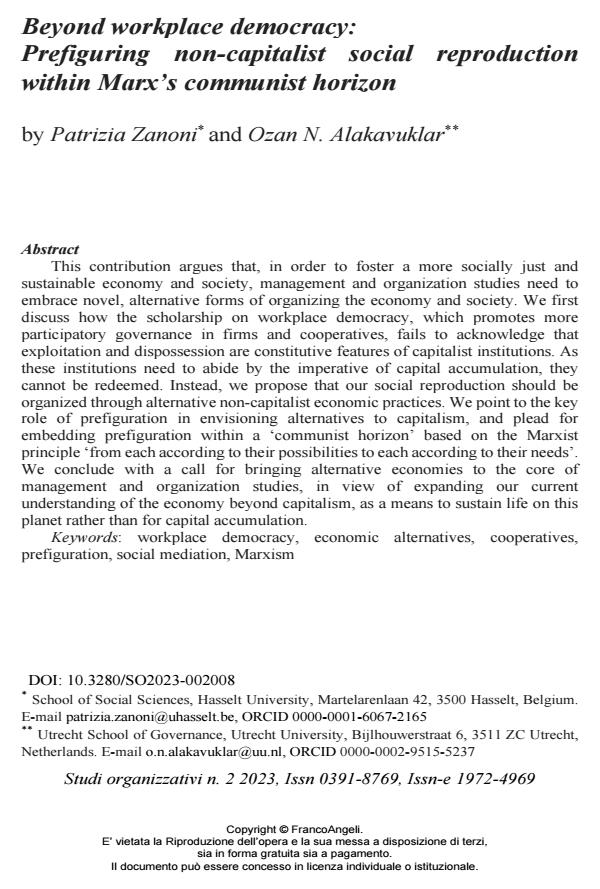Beyond workplace democracy: Prefiguring non-capitalist social reproduction within Marx’s communist horizon
Titolo Rivista STUDI ORGANIZZATIVI
Autori/Curatori Patrizia Zanoni, Ozan N. Alakavuklar
Anno di pubblicazione 2024 Fascicolo 2023/2
Lingua Inglese Numero pagine 32 P. 162-193 Dimensione file 565 KB
DOI 10.3280/SO2023-002008
Il DOI è il codice a barre della proprietà intellettuale: per saperne di più
clicca qui
Qui sotto puoi vedere in anteprima la prima pagina di questo articolo.
Se questo articolo ti interessa, lo puoi acquistare (e scaricare in formato pdf) seguendo le facili indicazioni per acquistare il download credit. Acquista Download Credits per scaricare questo Articolo in formato PDF

FrancoAngeli è membro della Publishers International Linking Association, Inc (PILA), associazione indipendente e non profit per facilitare (attraverso i servizi tecnologici implementati da CrossRef.org) l’accesso degli studiosi ai contenuti digitali nelle pubblicazioni professionali e scientifiche.
This contribution argues that, in order to foster a more socially just and sustainable economy and society, management and organization studies need to embrace novel, alternative forms of organizing the economy and society. We first discuss how the scholarship on workplace democracy, which promotes more participatory governance in firms and cooperatives, fails to acknowledge that exploitation and dispossession are constitutive features of capitalist institutions. As these institutions need to abide by the imperative of capital accumulation, they cannot be redeemed. Instead, we propose that our social reproduction should be organized through alternative non-capitalist economic practices. We point to the key role of prefiguration in envisioning alternatives to capitalism, and plead for embedding prefiguration within a ‘communist horizon’ based on the Marxist principle ‘from each according to their possibilities to each according to their needs’. We conclude with a call for bringing alternative economies to the core of management and organization studies, in view of expanding our current understanding of the economy beyond capitalism, as a means to sustain life on this planet rather than for capital accumulation.
Questo contributo sostiene che – per promuovere un’economia e una società socialmente più giuste e sostenibili – gli studi organizzativi dovrebbero abbracciare nuove e alternative forme di organizzazione dell’economia e della società. In primo luogo, discutiamo di come gli studi sulla democrazia nei luoghi di lavoro, che promuovono una governance più partecipativa nelle imprese e nelle cooperative, non riconoscono che lo sfruttamento e l’espropriazione sono caratteristiche costitutive delle istituzioni capitalistiche, le quali, dovendo attenersi all’imperativo dell’accumulazione del capitale, non possono essere riscattate o riconvertite. In alternativa, proponiamo che la nostra riproduzione sociale sia organizzata attraverso pratiche economiche alternative non capitaliste. In particolare, sottolineiamo il ruolo chiave della prefigurazione nell’immaginare alternative al capitalismo e chiediamo di inserire la prefigurazione in un ‘orizzonte comunista’ basato sul principio marxista: Ognuno secondo le sue capacità, a ognuno secondo i suoi bisogni. Infine, concludiamo con un appello a portare le economie alternative al centro degli studi organizzativi, con l’obiettivo di espandere la nostra attuale comprensione dell’economia al di là del capitalismo, intendendola dunque come mezzo per sostenere la vita su questo pianeta piuttosto che per l’accumulo di capitale.
Parole chiave:democrazia nei luoghi di lavoro, economie alternative, cooperative, prefigurazione, mediazione sociale, marxismo
Patrizia Zanoni, Ozan N. Alakavuklar, Beyond workplace democracy: Prefiguring non-capitalist social reproduction within Marx’s communist horizon in "STUDI ORGANIZZATIVI " 2/2023, pp 162-193, DOI: 10.3280/SO2023-002008